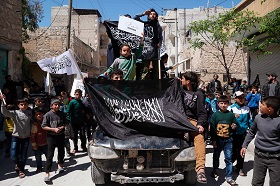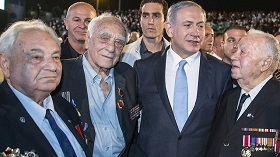On May 15, 2015 Benyamin Netanyahu’s government was approved by the Knesset, so we met Ilya Vasilyev, Political scientist, Consultant on politics and new media of Minister of Information of Israel (2009-2013), Speaker of the Knesset consultant (2013-2015), to find out more about the prime minister's plans for his new term, prospects for a Middle East settlement, and Israelis’ attitudes to the Victory Day.
On May 15, 2015 Benyamin Netanyahu’s government was approved by the Knesset, so we met Ilya Vasilyev, Political scientist, Consultant on politics and new media of Minister of Information of Israel (2009-2013), Speaker of the Knesset consultant (2013-2015), to find out more about the prime minister's plans for his new term, prospects for a Middle East settlement, and Israelis’ attitudes to the Victory Day.
What changes in Israel's policies do you expect from the new government?
Observers expected a coalition that would secure his convincing victory in the early elections but it gained only 61 out of 120 seats in the Knesset. This is Netanyahu's third successive government and fourth in total. Despite ideological similarities and the absence of left-wing and centrist parties, which caused the dissolution of the previous cabinet, Israeli analysts are not sure the alliance will last. With a majority that slim, any major foreign policy decision, let alone social and economic moves, would be very difficult. However, over time new partners can be expected to arrive and solidify the coalition.
Radical changes in the Israeli foreign policy are unlikely due to the overall dead-end in relations with the Palestinians and Israel's tactical opposition to PNA head Mahmoud Abbas’ unilateral steps regarding UN recognition contrary to prior commitments, and the mobilization of international opinion through anti-Israeli resolutions, boycotts and other "initiatives." International recognition of the Palestinian state will have no practical impact on the status quo, because Palestinians have no legitimate leaders and essentially live on the benefits handed out by European taxpayers and the UN. Fattah and Hamas are engulfed in a seemingly eternal conflict, and Palestinian politicians neither want to nor are in a position to launch civilized mechanisms to develop "their" territories and population.
Besides, after the Arab Spring, the area around Israel is volatile, which precludes any sort of political activity. The Iranian issue remains of paramount importance for Israel, thousands or maybe even dozens of thousands of the latest missiles targeted by the Hezbollah against northern Israel from Lebanon, as well as the threat of shelling from the Gaza Strip. The Israeli security establishment is also worried by developments in Jordan, Egypt and especially Syria.
Major changes in international relations are not likely, Russia included.
What about the prospects for a Middle East settlement? Will the new government suggest new scenarios?
The new government has not yet voiced any fresh initiatives. And the deteriorating environment in the Middle East and Northern Africa is unlikely to trigger their emergence.
Today Israel is deprived of regional allies and partners, although previously Turkey and Egypt were seen as such. Destabilization along Israel’s borders, the emergence of socio-political models such as the Islamic State and the mobilization of Sunni Arab countries against Iran – all that delivers a radically changed regional reality, in which conflicts are generated not only by states but also by organizations, movements and even territories, including Hamas, Hezbollah, IS, the Houthi, as well as certain Syrian, Iraqi and Libyan provinces, etc. Consequently, Yemen, Libya, Iraq and Syria are de facto divided, and their respective governments have no control over their territories.
Besides, local conflicts seem to be growing in scale, as some countries and territories are moving to revise borders Kosovo or Ukraine-style. Many observers predict these, or similar, scenarios for the Middle East, which is already permeated by chronic conflicts, border disputes and territories populated largely by religious, ethnic and other minorities.
Do you see any role in the Middle East settlement for Russia?
Israel relies on Russia in its search for amenable solutions on Iran's nuclear program and the prevention of modern weapons supplies to the already volatile Middle East. Recently some of the latest American weapons and weapons systems were acquired in Aden by the Houthi, and another batch intended for the Iraqi army in Mosul fell into hands of IS, which only underlines the extent of the danger. Unfortunately, sooner or later, some of these weapons will be seized by small or large terrorist groups with the intention of using them against Israel and its citizens.
Since Tehran is striving to attain regional hegemony, including by supporting terrorist organizations, and has repeatedly claimed that the annihilation of Israel is its political and military priority, we are deeply concerned about the Russian arms delivered to Iran.
In a broader context, the current developments in the Middle Easter go beyond the bitter conflict between the Shiites and the Sunnis, beyond the faith-based and inter-community clashes, and beyond quarrels between tribal chiefs. Deep in the game we see structures close to al-Qaeda and similar groups who are fundamentally opposed to modern civilization. It could be disastrous for a region that has accumulated enormous arsenals.
The political elite does not seem up to this task, and the absence of common values and principles among leading countries severely hampers the solution of the Middle East’s problems. By the way, many issues – religious fanaticism, ineffective governance, persecution of minorities including forcible de-Christianization, etc. – have nothing to do with Israel and the Arab-Israeli conflict. During the past decade, whenever crises broke out in the United States and Europe, the traditional politcal-military approach prevailed, in which force became the primary vehicle for settling the Middle East’s problems. And you know the consequences – Afghanistan, Iraq, Libya and Yemen.
The successful chemical disarmament of Syria, sponsored by Russia, could become a new approach for the broader Middle East. This new thinking and strategic vision could replace the interventionism we have seen to date – based on outdated perceptions about the primacy of military force. Moscow's role seems indispensible in ensuring the nonuse and nonproliferation of lethal weapons (including nonconventional weapons), as well as control over their stocks.
What is the role of the Russian diaspora in Israel? Does it communicate with Russia and improve Russia's image abroad?
The Russian or rather Russian-language diaspora in Israel has always been quite prominent, as it was expats from the Russian Empire who were leading figures among the founders of the current Israeli state. After 1988, over one million citizens of the USSR, Russia and CIS countries moved to Israel, radically changing its demographic and socio-economic landscape. Many of them maintain family, professional and personal relations with Russia, and over 100,000 also have Russian citizenship. Russia provides Israel with dozens of thousands of workers and about half a million of tourists annually. You can hear the Russian language here in Israel almost as often as you do in Russia. These cultural, linguistic and human bridges create a unique dimension in the relations between our countries and peoples.
What is the Israeli approach to Victory Day, World War II as a whole and the wartime role of the USSR?
The memory of World War II remains a key factor in the development of bilateral human and political relations. The arrival of one million Soviet citizens dramatically changed the historical perception of the War in Israel, as previously military operations and successes of the winning powers was mostly seen in the context of the Holocaust, the European tragedy of the Jewish people. And it was only in the late 1980s, when dozens of thousands of WWII veterans came to Israel, the phenomenon of heroism and Victory began its conquest of the public consciousness. Victory Day was made official in Israel in 2005. Since May 9 was Saturday, this year it was celebrated on May 7 in the Armored Corps Memorial Center for the first time in a big way. The ceremony was attended by President Reuven Rivlin, Prime Minister Benjamin Netanyahu, Defense Minister Moshe Ya'alon and Chief of Staff Gadi Eisenkot.
Another memorable event took place in 2012, when the presidents of the two countries unveiled the memorial to Soviet soldiers in the city of Netanya, one of the few monuments to the Red Army erected after 1992. This monument and similar undertakings, such as the Russian-Israeli initiative to perpetuate the memory of the heroes who revolted in extermination camp Sobibor, are of great significance for the bilateral relationship. On the one hand, WWII offers a historical and ideological basis for strengthening relations between states, and on the other, this is the most effective and genuine building block in people-to-people diplomacy.
Statements by Israeli leaders suggest that Israeli views on the USSR’s role are closest to the Russian approach. Alongside Russia, Israel at all platforms calls for vehement opposition to Holocaust denial and the distortion of the outcomes of WWII, one of which was the creation of a geopolitical environment for the establishment of Israel.
Prepared for publication by Daria Khaspekova, RIAC Website Editor-in-Chief

.jpg)




